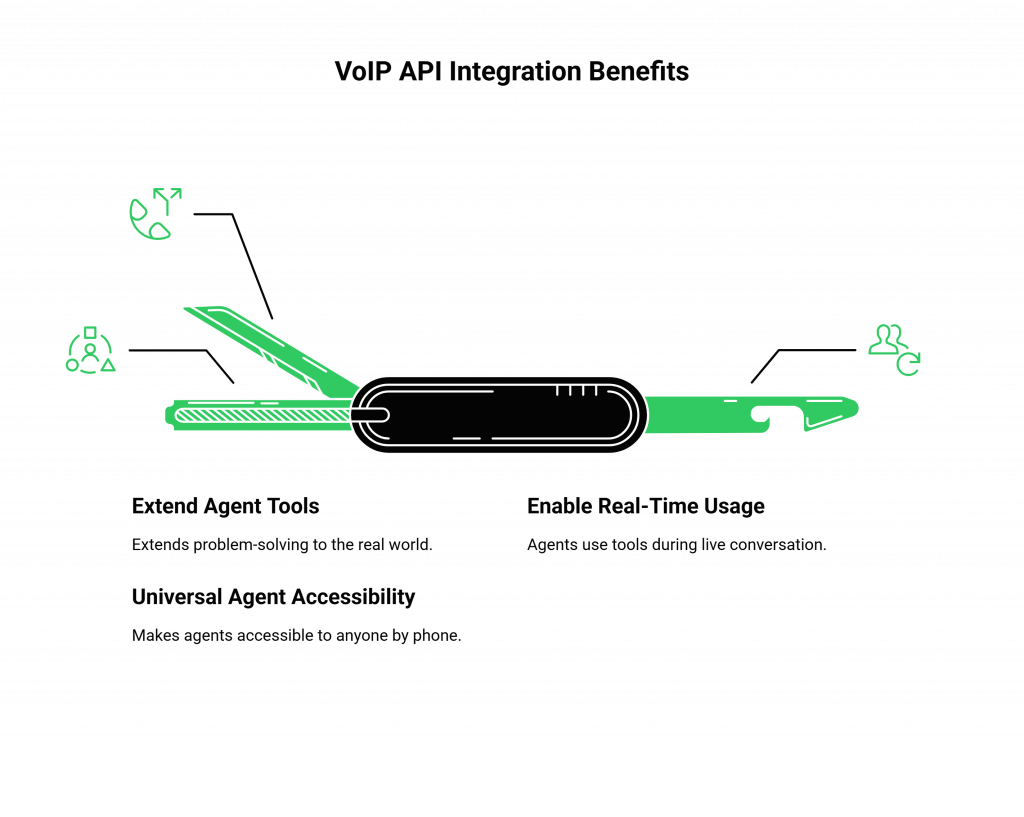For developers building with the Fixie AI platform, the power is palpable. You can rapidly create and deploy sophisticated AI agents that can access a corpus of tools, from simple code snippets to complex external APIs. These agents are not just chatbots; they are problem-solvers.
Yet, even the most intelligent Fixie agent has a fundamental limitation: it operates in a world of text. To break this barrier and unlock its true potential, developers are turning to a critical technology: VoIP Calling API Integration for Fixie AI.
Imagine your agent, which can already query your company’s database and interact with third-party services, could now pick up the phone to have a real-time, spoken conversation with a user.
This guide will explore the key reasons why developers choose to add a voice layer to their Fixie agents, transforming them from powerful digital tools into autonomous, real-world assistants.
Table of contents
What is Fixie AI?
Fixie AI is a platform designed for developers to build, host, and scale AI agents that can use tools. It simplifies the process of giving Large Language Models the ability to interact with the outside world.

Features of Fixie AI
- Tool-Based Architecture: Fixie’s core strength is its focus on agents that can call upon a “corpus” of tools. These tools can be any piece of code, from a simple function to a complex API call.
- API-First Agents: Every agent you build on Fixie is automatically exposed as an API endpoint. This is the crucial feature that makes a voice integration possible.
- Rapid Development: The platform is designed to let you build and deploy functional, tool-using agents quickly.
In essence, Fixie provides the framework for an AI “brain” that can not only think but also do things by using tools.
Top Reasons for VoIP Calling API Integration for Fixie AI

Developers are not adding voice just for novelty; they are doing it to unlock specific, high-value capabilities that are impossible to achieve with text alone.
To Extend Agent “Tools” into Human Conversation
The core power of Fixie is giving agents tools. A VoIP API is, in essence, the ultimate tool: the ability to talk to a human. This extends your agent’s problem-solving capabilities from the digital realm into the real world.
- Developer Impact: You can design workflows where a conversation is a planned step. For example, if a digital tool (like a database query) fails, the agent’s next step can be to initiate a voice call with a human to resolve the ambiguity.
Also Read: Programmable Voice APIs Vs Cloud Telephony Compared
To Enable Real-Time, Interactive Tool Usage
This is a game-changer. A voice integration allows a Fixie agent to use its tools during a live conversation. The user’s spoken words can provide the exact parameters the agent needs to run a tool, and the agent can speak the result back instantly.
- Developer Impact: Imagine a user calls and says, “What’s the status of order number 12345?” The voice system transcribes this, your application passes it to your Fixie agent, and the agent instantly recognizes it needs to use the getOrderStatus(order_id=12345) tool. It runs the tool, gets the result, and speaks the answer, all in one seamless, conversational turn.
To Make Powerful Agents Universally Accessible
The telephone is the most ubiquitous communication interface on the planet. A VoIP Calling API Integration for Fixie AI makes your sophisticated, tool-using agent accessible to anyone who can make a phone call, dramatically expanding your user base.
- Developer Impact: You are no longer limited to users who have your app or visit your website. You can deploy powerful AI assistants for public information lines, non-profit helpdesks, or for elderly users who are more comfortable with a phone than a computer.
Also Read: How To Lower Latency In Voice AI Conversations?
Why Do You Need FreJun AI?
Fixie AI masterfully handles the agent’s logic and tool usage. To make that agent speak, you need a specialized voice infrastructure that can match its speed and intelligence. This is the exact problem FreJun AI solves. Our philosophy is “We handle the complex voice infrastructure so you can focus on building your AI.”
For a Fixie developer, FreJun AI provides the reliable, low-latency “plumbing” to connect your agent’s API endpoint to the telephone network. Our developer-first APIs are designed to make this integration clean and simple. So, you can focus on what makes your agent smart, not on the complexities of telecommunications.
Also Read: How VoIP Calling API Integration for ElevenLabs.io Improves AI Voice Apps?
Conclusion
Developers choose a VoIP Calling API Integration for Fixie AI to fundamentally evolve what their agents are capable of. It transforms them from powerful but silent digital tools into autonomous assistants that can proactively engage with users, execute complex workflows that involve human interaction, and operate in the real world.
By giving your Fixie agent a voice, you are not just adding a feature; you are unlocking its full potential.
Also Read: What is Cloud Telephony? Complete Guide for Businesses
Frequently Asked questions (FAQs)
No. Fixie AI is a platform for building the logic and tool-using capabilities of an agent. To connect it to the telephone network, you must integrate it with a separate VoIP API provider.
A Speech-to-Text (STT) service transcribes the user’s spoken words into text. Your application then sends this text as an input to your Fixie agent’s API endpoint, just like a text-based query.
Latency. The total time from when the user stops speaking to when the agent begins its spoken response must be extremely low (ideally under a second). A low-latency voice infrastructure is non-negotiable.
You provision a phone number from your chosen voice infrastructure provider. From their dashboard, you can configure this number to connect to your application, which in turn communicates with your Fixie agent.
